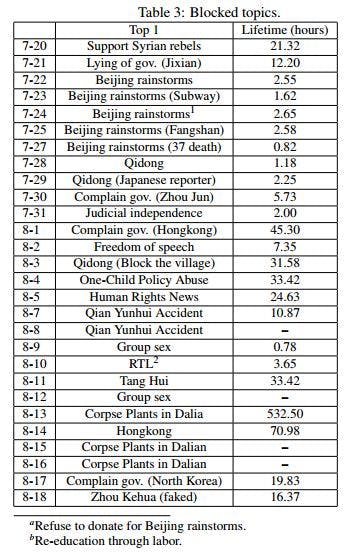With a population of a billion people, most of whom seem to be on the Web at any given time, China is the acknowledged champion of online censorship. It’s no small task, combining filtering technology, societal pressure, laws and the threat of imprisonment to keep the riotous Chinese Internet in line.
Now, Rice University, Bowdoin College and the University of New Mexico have released a study that took a detailed look at how the Chinese authorities censor Sina Weibo, the Twitter-like microblogging service that is hugely popular in the country. Weibo has almost 400 million registered users who post about 100 million messages a day.
The findings outlined in “The Velocity of Censorship: High-Fidelity Detection of Microblog Post Deletions” are based on a study of “users likely to participate in sensitive topics” on Weibo.
- Authorities take down 12 percent of posts on Weibo, about 12 million posts per day.
- 30 percent of deleted posts are taken down within five to 30 minutes.
- 90 percent of deletions happen within 24 hours.
- Topics where “mass removal happens the fastest” combine events that are popular on Weibo (Beijing rainstorms or a sex scandal) with themes common to sensitive posts (Beijing, government, China, and policeman).
The research led the study’s authors to a set of hypotheses about how Chinese authorities recognize and delete posts on Weibo, backed up with data from the study.

These methods are analogous to what the Chinese authorities do to the Internet as a whole insofar as they cast a wide net and attack the “problem” from a number of different angles. As the authors write, “Our results suggest that Weibo employs a distributed, heterogeneous strategy for censorship that has a great amount of defense-in-depth.”
Based on past patterns of Weibo censorship, this is how the researchers assume the social network’s moderators operate:
- There is a surveillance keyword list that triggers for posts to be looked at by a moderator for possible deletion.
- Weibo targets specific users, such as those who frequently post sensitive content.
- When a sensitive post is found, a moderator will find all of its related reposts (parent, child, etc.), and delete them all at once.
- Weibo removes posts retroactively via keyword search, causing spikes in the deletion rate of a particular keyword within a short amount of time.
- The censors work relatively independently, in a distributed fashion. Some of them may work in their spare time.
- Deletion speed is related to the topic; that is, particular topics are targeted for deletion based on how sensitive they are.
Even though it’s nearly impossible to suppress ideas on the Internet, this system manages a pretty close approximation by quickly and efficiently censoring keywords and individual users.
Photo from Sina Weibo via Cronkite


